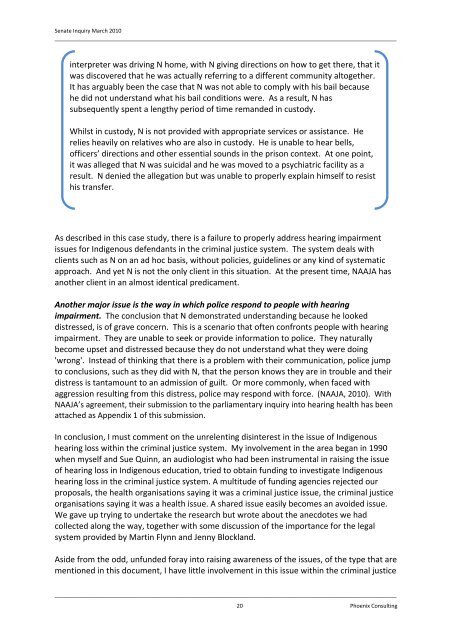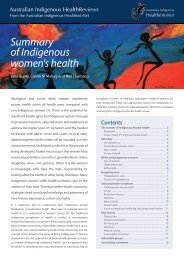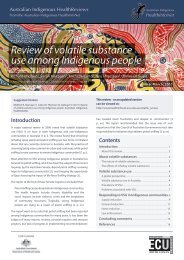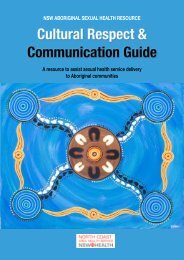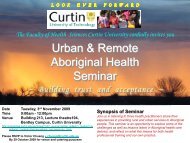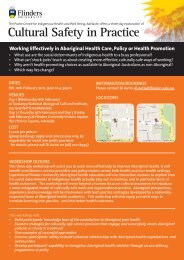hearing loss and the criminal justice system - Australian Indigenous ...
hearing loss and the criminal justice system - Australian Indigenous ...
hearing loss and the criminal justice system - Australian Indigenous ...
You also want an ePaper? Increase the reach of your titles
YUMPU automatically turns print PDFs into web optimized ePapers that Google loves.
Senate Inquiry March 2010_________________________________________________________________________________________________________________interpreter was driving N home, with N giving directions on how to get <strong>the</strong>re, that itwas discovered that he was actually referring to a different community altoge<strong>the</strong>r.It has arguably been <strong>the</strong> case that N was not able to comply with his bail becausehe did not underst<strong>and</strong> what his bail conditions were. As a result, N hassubsequently spent a lengthy period of time rem<strong>and</strong>ed in custody.Whilst in custody, N is not provided with appropriate services or assistance. Herelies heavily on relatives who are also in custody. He is unable to hear bells,officers’ directions <strong>and</strong> o<strong>the</strong>r essential sounds in <strong>the</strong> prison context. At one point,it was alleged that N was suicidal <strong>and</strong> he was moved to a psychiatric facility as aresult. N denied <strong>the</strong> allegation but was unable to properly explain himself to resisthis transfer.As described in this case study, <strong>the</strong>re is a failure to properly address <strong>hearing</strong> impairmentissues for <strong>Indigenous</strong> defendants in <strong>the</strong> <strong>criminal</strong> <strong>justice</strong> <strong>system</strong>. The <strong>system</strong> deals withclients such as N on an ad hoc basis, without policies, guidelines or any kind of <strong>system</strong>aticapproach. And yet N is not <strong>the</strong> only client in this situation. At <strong>the</strong> present time, NAAJA hasano<strong>the</strong>r client in an almost identical predicament.Ano<strong>the</strong>r major issue is <strong>the</strong> way in which police respond to people with <strong>hearing</strong>impairment. The conclusion that N demonstrated underst<strong>and</strong>ing because he lookeddistressed, is of grave concern. This is a scenario that often confronts people with <strong>hearing</strong>impairment. They are unable to seek or provide information to police. They naturallybecome upset <strong>and</strong> distressed because <strong>the</strong>y do not underst<strong>and</strong> what <strong>the</strong>y were doing'wrong'. Instead of thinking that <strong>the</strong>re is a problem with <strong>the</strong>ir communication, police jumpto conclusions, such as <strong>the</strong>y did with N, that <strong>the</strong> person knows <strong>the</strong>y are in trouble <strong>and</strong> <strong>the</strong>irdistress is tantamount to an admission of guilt. Or more commonly, when faced withaggression resulting from this distress, police may respond with force. (NAAJA, 2010). WithNAAJA’s agreement, <strong>the</strong>ir submission to <strong>the</strong> parliamentary inquiry into <strong>hearing</strong> health has beenattached as Appendix 1 of this submission.In conclusion, I must comment on <strong>the</strong> unrelenting disinterest in <strong>the</strong> issue of <strong>Indigenous</strong><strong>hearing</strong> <strong>loss</strong> within <strong>the</strong> <strong>criminal</strong> <strong>justice</strong> <strong>system</strong>. My involvement in <strong>the</strong> area began in 1990when myself <strong>and</strong> Sue Quinn, an audiologist who had been instrumental in raising <strong>the</strong> issueof <strong>hearing</strong> <strong>loss</strong> in <strong>Indigenous</strong> education, tried to obtain funding to investigate <strong>Indigenous</strong><strong>hearing</strong> <strong>loss</strong> in <strong>the</strong> <strong>criminal</strong> <strong>justice</strong> <strong>system</strong>. A multitude of funding agencies rejected ourproposals, <strong>the</strong> health organisations saying it was a <strong>criminal</strong> <strong>justice</strong> issue, <strong>the</strong> <strong>criminal</strong> <strong>justice</strong>organisations saying it was a health issue. A shared issue easily becomes an avoided issue.We gave up trying to undertake <strong>the</strong> research but wrote about <strong>the</strong> anecdotes we hadcollected along <strong>the</strong> way, toge<strong>the</strong>r with some discussion of <strong>the</strong> importance for <strong>the</strong> legal<strong>system</strong> provided by Martin Flynn <strong>and</strong> Jenny Blockl<strong>and</strong>.Aside from <strong>the</strong> odd, unfunded foray into raising awareness of <strong>the</strong> issues, of <strong>the</strong> type that arementioned in this document, I have little involvement in this issue within <strong>the</strong> <strong>criminal</strong> <strong>justice</strong>_________________________________________________________________________________________________________________20 Phoenix Consulting


